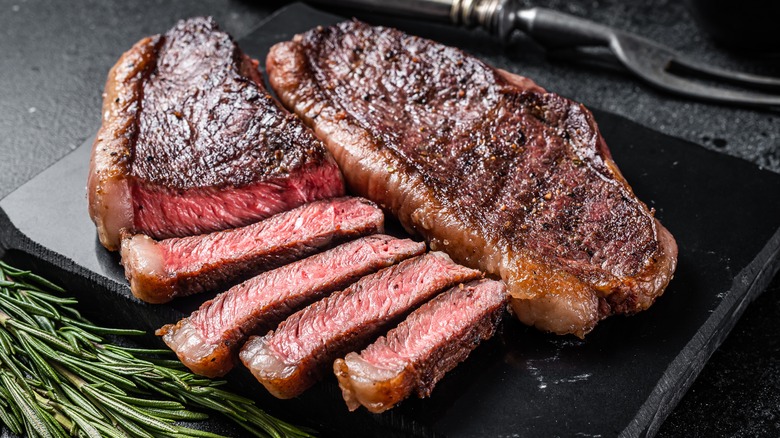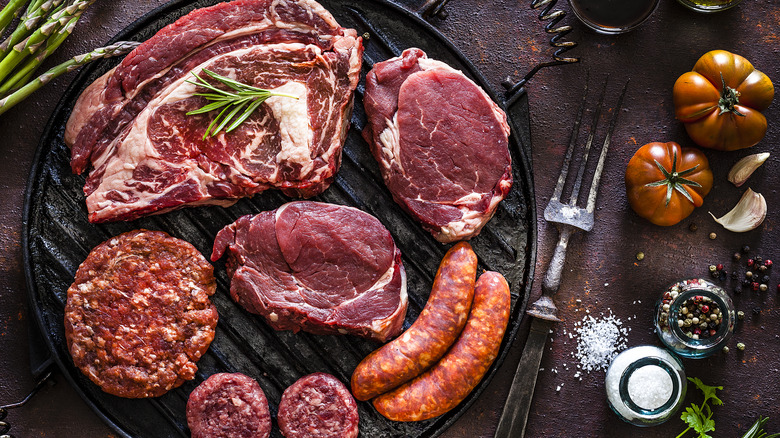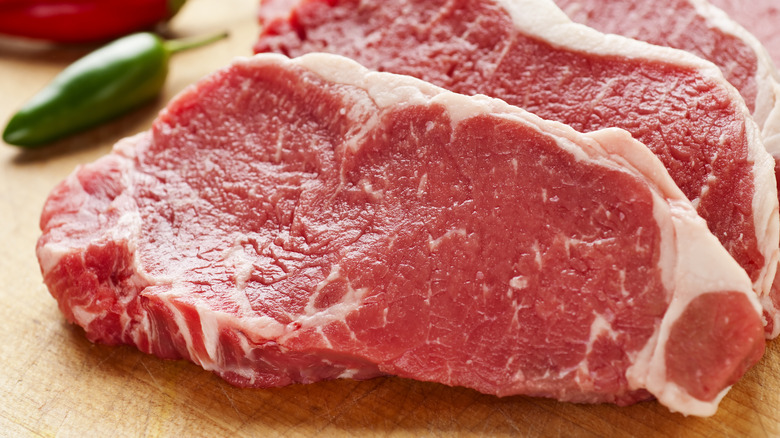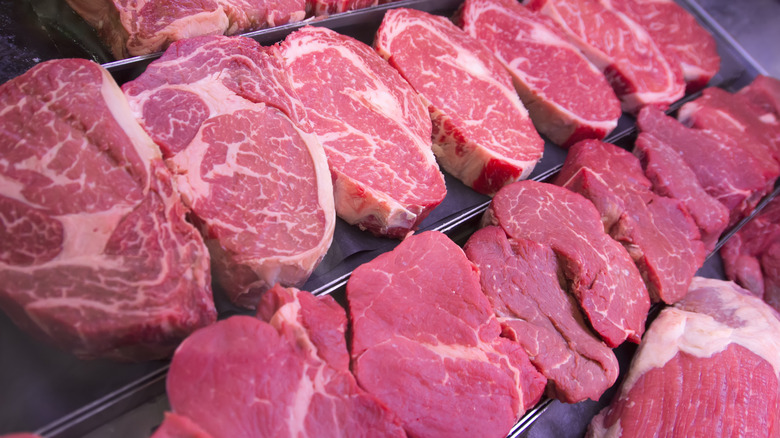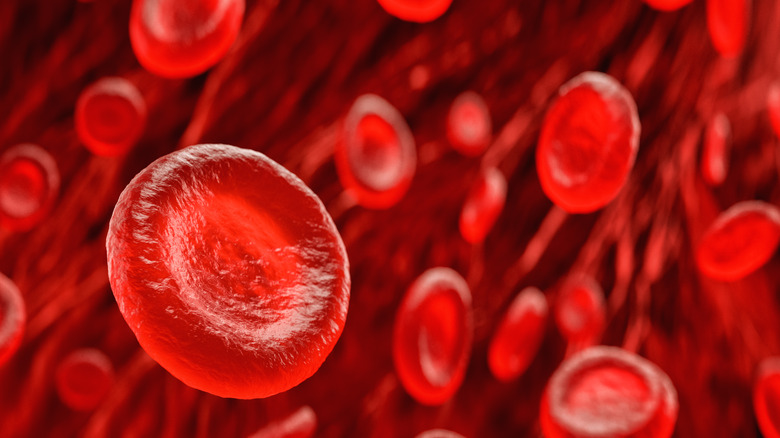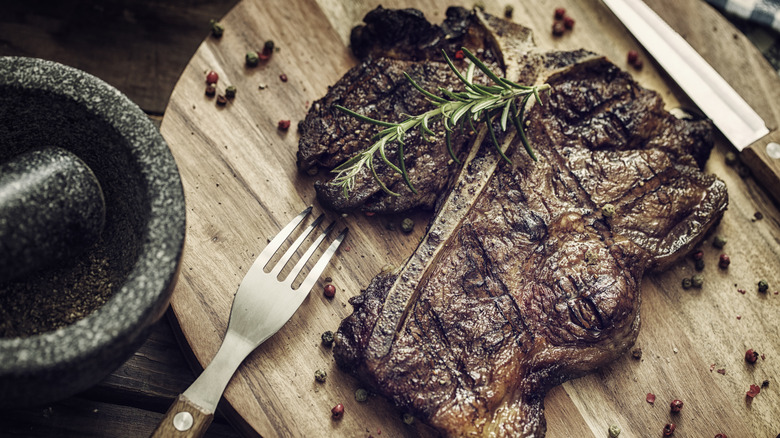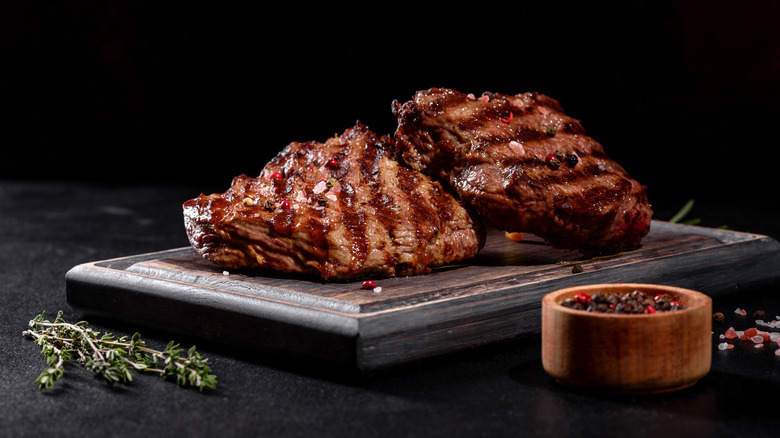What Happens If You Eat Red Meat Every Day?
Have you ever found it hard to say no to a piping-hot double cheeseburger from McDonald's? Or how about a nice, juicy steak? Or a tender, slow-cooked pulled pork sandwich? There's no denying that red meat is a delicious addition to one's diet — and, in many ways, it can be beneficial to one's health. However, eating it every day might not be the best idea.
The topic of eating red meat is a divisive one, even among doctors and other medical professionals. It seems like every few weeks there is a new headline exclaiming that "Red Meat Is Healthy for You," followed soon after by "X Reasons You Shouldn't Eat Red Meat." So, what's a carnivore or omnivore to do?
The objective answer to whether red meat is healthy or not is that it depends on what kind of red meat you are eating, how often you are eating it, and in what quantity. Like with all things, red meat should be enjoyed in moderation, but if you want to eat it every day, here are a few things that might happen.
What is red meat?
First and foremost, what constitutes red meat? This might seem like a simple question, but there are actually more forms of red meat than one might be aware of.
When most people refer to red meat, they are probably referring to beef, which is meat that comes from cattle. Two common examples of beef are steak and ground beef, which is often used in hamburgers. Veal is made from young cows and is also red meat. Both lamb (baby sheep) and mutton (adult sheep) are considered to be red meat as well, as is goat meat. Venison, or deer meat, is red meat, too. Even though some people refer to pork as "the other white meat," pig meat is, in reality, a red one. Poultry like chicken, goose, turkey, or duck are the real white meats, as is rabbit.
But the categorizing doesn't end there. Red meat can be further broken down into different groups, starting with lean meat, which is meat with a lower fat content. This is the opposite of fatty meats like bacon and pork sausage, which, as one might imagine, have a higher fat content. There are also processed meats, which are meats that have been preserved using preservatives, salt, or smoking or curing processes. This last category is considered to be the least healthy due to its higher salt and fat content.
Red meat might improve some of your body's functions
There may be a lot of wariness out there about what harm red meat can do to you, but it can also give you important vitamins and minerals that you need to keep your body working properly. Vitamin B12, for instance, is essential for a healthy nervous system, and red meat is chock full of it. It helps to promote the formation of healthy red blood cells, DNA synthesis, and more.
Vitamin B12 can also aid your metabolism, increasing your energy levels and physical endurance. It can give you more stamina and assist you in having the drive to not just get through your workouts but your other daily tasks, as well. If you don't want to fill up your diet with red meat, though, you can also find vitamin B12 in fish like salmon, tuna, and sardines, as well as in milk, yogurt, eggs, and some breakfast cereals.
You might eat too much saturated fat
One con of eating red meat every day is that you might ingest too much saturated fat, which are fats that become solid when they are at room temperature. They are found in products that are made with things that come from animals, such as beef and pork, as well as milk and cheese products. Saturated fats get their name because they are saturated with hydrogen molecules. This is what leads to them becoming a solid at room temperature, as opposed to unsaturated fats like olive oil that remain in a liquid form.
Eating too much saturated fat can cause an increase in your LDL cholesterol levels, also referred to as "bad cholesterol levels." High levels of LDL are responsible for a buildup of plaque in one's arteries, which can lead to heart attack or other heart disease. This is why many doctors recommend that patients who have high cholesterol or are at risk for it keep the red meat in their diet to a minimum.
Your muscles may get bigger and stronger
Are you looking to bulk up, or even just to build healthier, stronger muscles? If so, red meat may be just what you need. Red meat contains B vitamins, protein, creatine, and multiple minerals that will contribute to increasing your muscle mass. Lean meat, particularly meat with 10% fat content, has plenty of calories and protein to feed your muscles with the nutrients they need without excess fat.
Keep in mind, however, that red meat won't grow your muscles by itself. It can be a great help, but only in addition to other good nutritional habits as well as a steady, solid workout regimen, as indicated by a study published in the American Journal of Clinical Nutrition. Resistance training is especially effective in helping to build muscles, but activities like walking, bicycling, swimming, and other physical activities are great choices as well.
Getting into the habit of eating red meat a few times per week as well as exercising a few times per week is a good way to get on track for your fitness goals.
Eating red meat might lead to heart disease
The most contentious topic when it comes to red meat is whether or not it can lead to heart disease. On the one hand, the vitamin B12 in red meat contributes to a healthy, well-functioning heart, which is a great thing.
On the other hand, studies have shown that other aspects of red meat have been linked to heart disease. Just why this is true is not clear. Some say that it is the tendency of red meat to elevate LDL cholesterol levels, but a 2022 study published in Arteriosclerosis, Thrombosis, and Vascular Biology suggests that there may be another process at work.
When we eat red meat, a chemical byproduct called trimethylamine N-oxide, or TMAO, is produced by the microbes present in our gut. This TMAO is meant to help digest the red meat, but scientists have discovered that it can also be linked to an increased risk of cardiovascular disease. This same risk was not present with the substances released during digestion of eggs, fish, or poultry.
More research is needed on this topic, but in the meantime, as always, it is advised to consume red meat in moderation, not every day.
It might increase your cancer risk
In addition to being linked to heart disease, an excess of red meat has also been linked to several types of cancer. This link was strong enough for the World Health Organization to make a statement in 2015 saying that unprocessed red meat is "probably carcinogenic to humans" and processed meat is, put more definitively, "carcinogenic to humans."
Processed meat in particular has been linked to colorectal cancer, which includes not just colon cancer but any cancer found in the large bowel, including cancer of the rectum. A 2021 study written up in Cancer Discovery found a unique form of DNA damage that presented itself in the colorectal tumors of patients who reported a high and frequent consumption of red meats, especially processed ones. Colorectal cancer is the third most common type of cancer in the United States and can cause symptoms such as stomach pain, changes in your bowel habits, and blood in your stool.
Not everyone who eats red or processed meats often will get colorectal cancer, but it is definitely something to keep in mind when planning your meals.
You will get all the essential amino acids
In addition to containing healthy B vitamins, red meats like beef are complete proteins. But what, exactly, makes a protein "complete?"
To put it simply, foods that are said to be complete proteins have all nine amino acids that we need to consume for our bodies to function. Amino acids are what the body uses to create proteins, and there are 20 that are essential to human life. Each one serves a different purpose, and you may have even heard of some of them, like tryptophan, which creates serotonin in the brain to manage things like your emotions, when and whether you feel hungry, and your sleep pattern. Our body naturally makes 11 of these amino acids on its own, but we still need to get the other nine (which are referred to as "essential amino acids") from our diet, or we would be in bad shape.
Beef and pork both have all nine of the amino acids we need to grow healthy muscles and tissues, so they are considered to be complete proteins.
You'll get your daily iron fix
Adult men need around 8 milligrams of iron each day. For women, iron is even more important. Women between the ages of 19 and 50 need 18 milligrams of iron each day in order to stay healthy, and even more if they are pregnant.
Iron is a mineral that is required for the body to make hemoglobin. This is a protein that is present in red blood cells, whose function is spreading oxygen from our lungs to the rest of our body via our bloodstream. Without enough iron in their diet, one runs the risk of becoming anemic, a condition in which there aren't enough red blood cells to move the oxygen where it needs to go within the body.
Iron cannot be produced by the body, so we have to get it from the food we eat. Every type of red meat is high in iron, with ground beef having 2.7 milligrams per 100-gram serving. Regular consumption of red meat can greatly reduce the likelihood of anemia, as well as contribute to healthier skin, hair, and nails. Since iron is such a necessity, those who don't eat meat will need to get their iron from another source — and typically require twice as much iron in their diet.
You may be more at risk for type 2 diabetes
Current studies aren't conclusive, but some evidence suggests that there could be a link between type 2 diabetes and eating excessive amounts of red meat. For a study ultimately published in the American Journal of Clinical Nutrition in 2021, tens of thousands of people were monitored for type 2 diabetes for several years. Their diet was assessed and updated every four years to see if it had any effect on their health.
The results showed that a gradual decrease in the amount of red meat consumed by the participants was linked to a decrease in the risk of type 2 diabetes. Instead of red meat, the subjects were asked to swap in another source of protein in their diet, such as poultry, eggs, dairy foods, or nuts. As with most other negative aspects of eating red meat, the connection between red meat consumption and type 2 diabetes was stronger in cases in which the person ate more processed meat products like ham, deli meats, or beef jerky.
While more studies are needed, research reports like this one have led doctors to recommend a decrease in red meat for people who are already at risk for type 2 diabetes, but only if it is replaced with another source of protein and other nutrients.
You might worsen kidney problems
If you suffer from chronic kidney disease (CKD), you will already be aware that red meat is not an ideal part of your diet. People with CKD slowly lose the function of their kidneys over the course of a period of years, which can potentially end with total kidney failure.
CKD causes many symptoms and side effects that can range from a deficiency in vitamin D to high blood pressure to anemia and more. It can also cause issues with the elimination of phosphates. Since red meat contains phosphorus, one of the minerals that combines with other elements to form phosphates, it is recommended to avoid eating it (or eating too much of it), as the body can't properly get rid of the phosphates red meat leaves behind.
For most people, phosphorus is actually important to maintain healthy bones and teeth, among other things. In fact, kidneys need phosphorus to function correctly. The problem comes with their elimination. They are supposed to help get rid of waste in the kidneys, but when this process doesn't work correctly, as is the case with CKD, it leads to a buildup of phosphates, which can lead to other serious health issues.
While most bodies eliminate the phosphates more efficiently, if you have a family history of kidney disease, you may want to find another source of the nutrients that red meat provides.
Red meat makes you feel fuller with a lower amount of calories
Have you ever struggled to stay on a healthy diet because you were always hungry? Red meat can help with that! In terms of its satiety index, which measures how full foods make you feel, lean red meat is one of the best things you can eat if you want to feel full without eating extra calories. We have to stress, however, that this only applies to lean red meat, not fatty meats or processed meats.
This satiating effect of lean red meat isn't just convenient when it comes to everyday meals. According to a paper published in Proceedings of the Nutrition Society, a diet providing sufficient — but not excessive — calories that's also high in protein can be helpful in promoting weight loss for those who are obese or at risk of becoming so as it reduces the urge to eat more.
Obesity remains one of the biggest health issues in the United States, so scientists are hard at work trying to find ways to treat and prevent it. Along with regular exercise and a general shift to a healthier diet, lean red meat and the protein it provides can be a great way to lose weight without feeling like you are constantly hungry.
Eating red meat cooked at a high temperature creates potentially harmful chemical compounds
There are obviously lots of pros and cons to eating red meat, but most of them focus on the red meat itself. They concern the effects it has on the body or the beneficial vitamins and minerals it may supply you with. But there is another thing to consider: the way red meat is cooked.
When red meat is cooked at very high temperatures, this can cause a chemical reaction that creates compounds that may be carcinogenic. Chemicals called heterocyclic amines (HCAs) and polycyclic aromatic hydrocarbons (PAHs) are created when meats like pork or beef are cooked at a very high temperature. This can include pan frying or cooking the meat over an open flame, such as on a grill or over a fire.
PAHs form due to smoke that contains juice from the meat that has dripped down into it, or from the meat smoking process in general. HCAs, on the other hand, are created when the sugars, amino acids, and other substances found in what is referred to as "muscle meat" react due to the high temperature. To be completely fair, however, this same type of chemical reaction has been observed with other types of meat and fish.
PAHs and HCAs have not been proven to cause cancer in people, so more research is needed to give a conclusive answer on the topic of high heat and red meat.
How much red meat is recommended in an average diet?
Despite the negative press it often receives, red meat can be an important part of a balanced diet ... but only if you consume it responsibly. Eating red meat every single day might make your taste buds happy, but the same might not be true for the rest of you.
The recommended amount of red meat per person is two to three servings per week. On average, though, Americans eat at least five servings. This, as doctors, scientists, and researchers point out, is too much and can undo all of the good that red meat does for our bodies.
However, there is a counterpoint: If the negatives of red meat outweigh the positives for you and you are thinking of cutting it out of your diet entirely, you should be aware that it isn't so simple. Red meat contains many essential vitamins and minerals, so you may wish to consult with a doctor or dietitian to help you learn what foods to use as substitutes to keep your body functioning properly.
So, at the end of the day, red meat can be beneficial, but only if you eat it in the right quantity.
